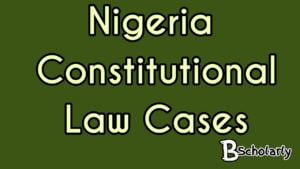The case of The Queen v Amalgamated press Ltd (1961) A.N.L.R 199 is one which is founded on the right to freedom of expression and press in the then 1961 constitution of Nigeria. It is often cited to explain the fact that the right to freedom of press in the constitution of Nigeria is not absolute.
Thus, the right to freedom of fair hearing and press can be derogated upon if it causes fear and alarm, which is contrary to section 59 (1) of the criminal code. More so, it can be derogated upon if it produces seditious publication as provided in section 51(1) (c) of the criminal code. The facts, issues and decision of the court in The Queen V. Amalgamated press Ltd are given below:

Also read: Awolowo V. Federal ministry of internal affairs (Case on the right to fear hearing in Nigeria)
Facts of the case of The Queen v Amalgamated press Ltd
The defendant (Amalgamated press limited) published a seditious publication which was capable of causing fear and alarm in the country contrary to section 51 (1) (c) and section 59 of the criminal code. He was arraigned at the High court of Lagos after the offence. His council argued that the said provisions of the criminal code were contrary to the right to expression guaranteed in section 24 of the constitution of the federation of Nigeria.
Thus, the provisions of section 51 (1) (c) and section 59 of the criminal code were void since it is law that where the constitution is in conflict with any law in Nigeria, the constitution of the federation will prevail. The trial court made no finding on the case but referred the issues raised by the defendant to the Supreme Court of Nigeria for further and better judgment.
Issues Determined By The Court
Whether the provision of the Criminal code relating to seditious publications against the Government as contained in section 51 (1) (c) and section 59 of the code have been validated by the provisions of section 1 and 24 of the constitution of the federal republic of Nigeria?
Whether the provision of the criminal code relating to false news likely to cause fear and alarm to the public as contained in section 59 (1) of the criminal code the criminal code have been invalidated by the provisions of section 1 and 24 of the constitution of the federation?
Also read: How to become a successful lawyer in Nigeria: 7 qualities you need
Decision of the court in The Queen v Amalgamated press Ltd
When the case got to the Supreme Court, the court made reference to the case of director of public prosecutions V. Chike Obi F.S.C (1961) A.N.L.R. 186 and conversely promulgated that (1) While reference under section 180 of the constitution of the federation are new and no specific procedure laid down, it will be of great assistance to the Supreme court is such as are referred for that court’s decision be put specifically by the court below (2) Section 1 and 28 of the constitution of the federation of Nigeria have not abrogated the law of sedition in Nigeria as contained in the provisions of the sections 50 and 51 of the criminal code (3) section 24 of the constitution of the federation guarantees nothing nut ordered freedom and it cannot be used as a license to spread false news likely to cause fear and alarm to the public; therefore section 59 (1) of the criminal code has not been invalidated by that constitutional provision.
This judgment was made by Ademola C.J.F on the 6th of April, 1961. The four other judges of the Supreme Court (Brett F.J, Unsworth F.J, Taylor F.J, Bairamian F.J) concurred with the judgment of Ademola C.J.F in the case.

Edeh Samuel Chukwuemeka, ACMC, is a lawyer and a certified mediator/conciliator in Nigeria. He is also a developer with knowledge in various programming languages. Samuel is determined to leverage his skills in technology, SEO, and legal practice to revolutionize the legal profession worldwide by creating web and mobile applications that simplify legal research. Sam is also passionate about educating and providing valuable information to people.